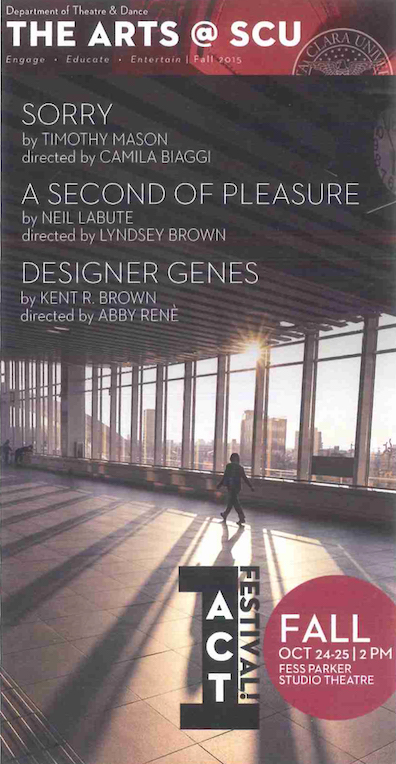
Faculty Advisor: Jeffrey Bracco
Fess Parker Studio Theatre
October 24–25, 2015
Theatre arts majors direct a diverse collection of one-act plays.
Directed by Camila Biaggi
SORRY
By Timothy Mason
Director's artistic statement
In Sorry, by Timothy Mason, we are presented with a fascinating examination of human loneliness. This play encourages us to explore just how important it is for us to feel wanted and cared for by others. Mason encourages us to ponder how far we would truly go to find humanconnection, presenting a situation that pushes beyond our levels of comfort. As the two characters desperately seek some form of connection and peace between one another we realize that, for each and every one of us, this yearning for human understanding and empathy takes precedence above all else.
Directed by Lyndsey Brown
A SECOND OF PLEASURE
By Neil Labute
Director's artistic statement
Every relationship seems to arrive at the same moment - you know the one. When amidst all of the strife and struggle, you look across the table at your mom, at your best friend, at your significant other, or at your boss and you ask yourself, "Is this worth it?" A Second of Pleasure examines what it means to be true to our relationships, and more importantly, what it means to be true to ourselves; because a spark of connection, even if only for a second, can remind us of who we are and why we choose to love.
Directed by Abby Rene
DESIGNER GENES
By Ken R. Brown
Director's artistic statement
Designer Genes invites you into a world that is hauntingly close to the one we live in today. The characters each deal with internal pain that drives theirdesires and actions, and use storytelling to show each other, and the audience, what goes on in their minds. In this process, I've had the exciting challenge of delving into psychological disorders, like PTSD and bipolar disorder. Kent R. Brown explores the ethical issues that modern science brings up, invites the audience into the private lives of a couple coping with tragedy and the stranger who gets involved in their story. As you witness the lives of Mr. and Mrs. Jordan and hear the different arguments, Kent R. Brown leaves us questioning life, normalcy, and the need to create.